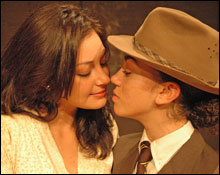 Cherrie Moraga’s The Hungry Woman, subtitled A Mexican Medea, is an attempt to incorporate pre-Hispanic La Llorona (the Weeping Woman) mythology with a quasi-contemporary tale of the Greek tragic figure, seen through a feminist lesbian lens. Its East Coast premiere is being staged by Brown University Theatre and Sock & Buskin in Leeds Theatre (through April 23).
Cherrie Moraga’s The Hungry Woman, subtitled A Mexican Medea, is an attempt to incorporate pre-Hispanic La Llorona (the Weeping Woman) mythology with a quasi-contemporary tale of the Greek tragic figure, seen through a feminist lesbian lens. Its East Coast premiere is being staged by Brown University Theatre and Sock & Buskin in Leeds Theatre (through April 23).
The Greek Medea was a princess and sorceress who helped Jason steal the Golden Fleece and eventually murdered their two children in revenge for his infidelity. This Medea (Angelica del Valle) is more circumscribed in circumstance and ability, not to mention nobility. In this dystopian fantasy world, Medea is in exile from Aztlán, a Chicano homeland liberated from northern Mexico and the American Southwest. She was cast out from her nation and her property by her husband Jasón (Natalie Hirsch), a fellow revolutionary, after she took a lesbian lover, Luna (Jenny Garcia). She fled with her five-year-old son, Chac-Mool (Arjun Bhartia), who is 13 and on the verge of manhood as the play opens. Jasón wants her back, by way of getting his son back while there is still time to instruct him in being a man. Since Medea feels compelled to stay with her son, an ongoing struggle with Luna ensues.
Flash-forwards take us to a mental hospital where Medea is held, for a reason we don’t know at first. Flashbacks take us to a Phoenix ghetto where she and Luna have been squabbling and raising Chac for the past seven years, as queers have become nomads not welcome in the Chicano homeland. Medea’s mother, Mama Sal (Elena Lobo), hobbles about with a colorful griot staff, giving wise advice to her daughter and grandson now and then. Sometimes the words are particularly well put, such as when she says to Luna, “If you twist and deform yourself to fill the spaces inside her, you end up crooked.”
Three tall silver discs comprise most of the scenery on stage, perhaps a reminder that the moon represents love and lunacy as well as Luna.
Of the several myths presented here, the one of La Llorona fits especially well. It parallels the Greek Medea story in that the Mexican woman also chooses to murder her children, in some versions to free them from poverty but in others as revenge for their father abandoning them. The mythic and sacred elements in The Hungry Woman are underscored by ceremonial dancing by characters representing the four directions, in native tradition. They are masked in bandannas like the Zapatistas of the mid-1990s, who successfully wrested control from the federal government in Chiapas.
The Hungry Woman is a fragmented theatrical offering. Sometimes the pieces are informative, as with the tale of a creation myth, and sometimes interesting information is only touched upon, as when Mama Sal mentions without elaboration such episodes as pesticides being sprayed on Mexican field workers, the Malquiladoras factories on the US border, and bombing range squatters on Vieques Island (in Puerto Rico) declaring independence.
An attentive theatergoer could be forgiven for wanting more, as well as wanting less — more cohesion among the thematic elements as well as the time-leaping scenes would be welcome. The political components sometimes seem pinned onto the characters like medals rather than climbed into like uniforms. Similarly, we can use fewer random characterizational touches left undeveloped. For example, late in the play Chac reveals that his birth certificate name is Adolfo and blurts, “I was born to be a Nazi — to have a Nazi life.” Established early on, this thunderclap of an inner conflict could have brought chilling resonance to many of his subsequent actions and arguments with his mother.
Playwright Moraga is also a poet, essayist, and coeditor of This Bridge Called Me Back: Writings by a Radical Women of Color. Her plays include the award-winning Shadow of a Man, Watsonville: Some Place Not Here, and Heroes and Saints, for which she won the Pen West Award for Drama in 1992. Director Ybarra’s specialty is critical historical analysis of the Americas, especially the relationships of theater, nationalism and American identities in North America. The former administrator of Richard Foreman’s Ontological-Hysteric Theatre in Manhat¬tan’s East Village, she now is a director and dramaturg there. She is currently working on a study titled Performing Conquest: Theatre, History and Identity in Tlaxcala, Mexico 1538-2003.
ADVERTISEMENT
 |